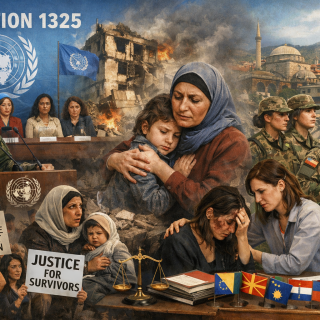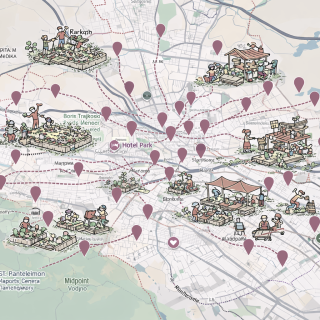The European Commission recently released its annual progress reports — an ideal moment to pause and reflect on where the Western Balkans stand on their path toward European integration.
Despite the title, this text is not written to pin the blame on Brussels. While colonial continuities and paternalistic frameworks do exist in the way the European Union (EU) approaches the region, the far deeper problem lies on our side. The EU’s approach may be flawed, but our own inability to meet obligations, sustain reforms, and resist tribal thinking has done more to slow progress than any supposed “imperial residue” in Europe’s capitals.
Europe in Flux and the Erosion of Certainty
To understand the EU’s behavior, we first need to acknowledge that Europe itself is in the midst of redefining what it is. For decades after the Cold War, the EU stood as an unquestioned aspiration — the ultimate destination of development and civilizational progress for the Western Balkans. That sense of clarity has faded.
The world has once again become multipolar, and the EU’s internal cohesion has been shaken on several fronts: Brexit, democratic backsliding in Hungary and elsewhere, divisions over Ukraine, and uncertainty in relations with the United States. The direction that once guided Europe’s foreign policy and enlargement — while never perfect — is now blurred. For our countries, this means the “European offer” no longer carries the sense of inevitability it once did. For some, alternative partnerships have started to look increasingly appealing.
The West’s Habit of Leaving Too Early
Another well-known flaw in the history of Western engagement is its tendency to pull out of the game too early. When the West does that, it usually enters with determination and then, once progress becomes visible — and sometimes without any clear benchmark — it declares the “mission accomplished” and shifts its attention elsewhere.
That happened here as well. The early 2000s were marked by a broad Western presence in the region. But by the 2010s, the focus had already shifted, even though Bosnia was still unresolved, Kosovo–Serbia relations remained unsettled, and the other countries were far from membership. The EU declared that our region was “on the right track” and redirected its attention elsewhere. The outcome was predictable: the Balkan ghosts returned. Nationalism strengthened again, revisionism reemerged, and democratic backsliding spread. Until then, the EU had become a key part of how we addressed our own problems, so once its attention drifted away, the region began to stumble. It created a dependency and then withdrew before the job was truly finished.
To be clear — completing our tasks was never solely the EU’s obligation. But when the Union takes on the role of an anchor and then pulls back halfway through, it creates vacuums that illiberal forces and competing interests easily fill. The lesson should have been simple: when the EU decides to lead, it needs to lead all the way.
Imperial Echoes and Selective Partnerships
Within this web of inconsistencies lie traces of old imperial thinking. The EU is still, to a large extent, a collection of states with divergent interests, often shaped by historical ties and spheres of influence.
A good example is the so-called “facilitation” of the Serbia–Kosovo dialogue. As the process slid into crisis, two schools of thought emerged within the Union: the first, supported mainly by France and Italy, places more trust in Serbia’s strategic commitment and shifts the blame onto Pristina; the second, led by Germany, sees Serbia’s non-recognition of Kosovo as the core problem. Behind this debate stand both historical affinities and investment patterns. For instance, the discussion about lifting EU measures against Kosovo became detached from reality on the ground and turned into an argument within the EU itself. The dialogue, in part, has become a platform for the EU’s internal geopolitics, leading to an inconsistent and indecisive approach.
Turning the Mirror Toward Ourselves
But this is where we need to turn the mirror toward ourselves — toward the “Ajvar Belt” of Europe: Montenegro, Albania, Serbia, Kosovo, North Macedonia, and Bosnia and Herzegovina.
The EU is what it is, but our situation cannot be explained by that alone. The accession path is not about changing the EU; it is a process based on meeting obligations, and it was not invented specifically for the Balkans. Every country in Central and Eastern Europe went through the same demanding political, institutional, and technical alignment.
Before pointing fingers at the EU, we need to honestly ask ourselves a few questions. Do we truly believe our states have met European standards? Are our political leaders genuinely committed and willing to do what is necessary? Do our cities look like Vienna? Is our experience at the local municipality anything like what we hear from relatives dealing with municipal offices in Germany? The uncomfortable answer is usually “no.” The EU may be paternalistic, but many countries have managed to join it. That’s why the main question is not what the EU is like, but whether we are doing our homework.
Evidence That the EU Does Respond
Despite its flaws, the EU has consistently responded when there was a reason to do so. Slovenia and Croatia were admitted as members. Visa liberalization was granted. Stabilization and Association Agreements were signed. Candidate statuses were approved. Chapters were opened and many were closed. Billions of euros have been invested through various funds and technical assistance. European companies are the largest investors in the region, and exports from the Western Balkans to the EU have grown several times over.
The facts remain: the EU rewards progress.
And its offer continues. The recently announced EU Growth Plan for the Western Balkans opens a new chapter of concrete, short-term economic integration. The goal is to narrow the gap between candidate countries and member states even before accession, linking access to markets and funds with measurable reforms. Importantly, it also signals the return of enlargement to the political agenda.
Meritocracy Still Exists
Montenegro and Albania are the region’s best examples. Both are close to accession — Montenegro likely by 2028, and Albania soon after.
Is that the result of neo-colonial favoritism? Hardly. It is the result of consistent commitment, alignment, and political consensus. For years, the governments of these countries — despite internal turbulence — have treated EU accession as a strategic, cross-partisan objective. They worked through the technical chapters, carried out reforms, and stayed on course while many others drifted into self-pity and blame-shifting. Their progress confirms a simple truth: even in an imperfect system, meritocracy still exists. The EU — slow and imperfect (and “neo-colonial,” if you insist) — nevertheless responds to effort and consistency.
And the Others?
So — to return to the difficult questions — what lessons should we draw from the examples of Montenegro and Albania? Do we, as societies, behave “European,” and do we genuinely pressure our governments to do their part? Is it “European” that every Serbian football match ends with a UEFA fine? Is it “European” for a minister to use the word “Šiptar” on television, as Vulin did? Is our corruption European? Was it European behavior that led to the imposition of measures against Kosovo? Is it European to block the state for the sake of secession, as Dodik has done for years?
If your answer is “yes,” or “I don’t care,” or “it’s the others/the EU who are to blame,” then good luck — but know that nothing will change that way. We cannot change the nature of the EU, its bureaucracy, or its internal rivalries. We can change only our own political cultures, administrative capacities, and expectations of those in power. We can demand that our governments meet the required criteria, reform the judiciary, genuinely address minority rights, professionalize public administration, and protect media freedom.
And we need to stop falling for the cheap ethno-nationalist tricks of political elites. Your Serbian identity, Albanian identity, Macedonian identity, Bosniak identity — and every other identity — exists without needing to be proven every single day. Instead, if you truly want your country to join the EU, then next time vote for the option that is clearly and demonstrably committed to that path — and see what happens if they win.
Senad Šabović is the representative of the European Institute of Peace (eip.org) for the Western Balkans, where the organization focuses on supporting the normalization of relations between Kosovo and Serbia. He has two decades of experience in democratization, minority rights, transitional justice, and good governance, gained through his work at the Humanitarian Law Center, the International Crisis Group, the OSCE Mission in Kosovo, and as an independent consultant. The views expressed in this text are his own.




